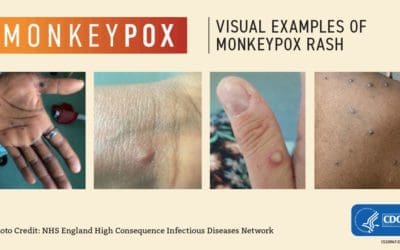Measles in the US: What You Need to Know

UPDATE: On Friday, April 18, Missouri announced a confirmed measles case in Taney County connected to international travel. The patient is a child whose vaccination status has not yet been verified. At this time, there is no indication of widespread exposure.
Our team will continue to monitor the situation closely. We strongly encourage reading the information below and making an appointment for your child’s MMR vaccine if necessary.
ACTUALIZACIÓN: El viernes 18 de abril, Misuri anunció un caso confirmado de sarampión en el condado de Taney, relacionado con un viaje internacional. El paciente es un niño con un estado de vacunación sin verificar. Por ahora, no hay indicaciones de exposición generalizada.
Nuestro equipo seguirá controlando la situación de cerca. Recomendamos encarecidamente que lean esta información y hagan una cita para recibir la vacuna triple vírica (SPR) si fuera necesario.
In 2000, measles was declared eliminated in the US — so why are some states, including nearby Kansas, now having measles outbreaks?
The answer isn’t a mystery: fewer kids are getting vaccinated against measles.
When at least 95% of people in a community are vaccinated, that community has herd immunity, meaning that diseases like measles can’t spread very far because so many people are immune. This helps protect unvaccinated people from getting sick, too. For decades, high childhood vaccination rates across the US have helped prevent measles outbreaks, but in some places that’s started to change.
We can see this in the ongoing measles outbreak in West Texas — the state’s worst in nearly 30 years — where local kindergarten vaccination rates are as low as 82%, far below the herd immunity threshold of 95%. According to the Texas Department of State Health Services, the outbreak now has grown to more than 450 measles cases across Texas, New Mexico, and Oklahoma, with 43 patients hospitalized. Sadly, unvaccinated teens and children have been the ones most affected by this outbreak, and one young child has died.
Closer to home, Missouri recently reported its first case of measles from a child with unknown vaccination status who had traveled internationally. And across state lines, this year the Kansas Department of Health and Environment reported its first case of measles since 2018. Just two weeks later, that single case grew to 23 cases across southwest Kansas — possibly also linked to the Texas outbreak.
With cases on the rise, it’s more important than ever to know the facts. Measles isn’t just a bad rash: this disease can lead to serious complications like pneumonia or brain swelling, with young children at highest risk. It’s also extremely contagious. In places where no one is vaccinated, one person with measles can infect up to 18 other people over the course of their sickness, and each of those people can infect another 18 — and suddenly a single case turns into an outbreak.
The good news? We have a safe, effective solution: the MMR vaccine, which was key to eliminating measles outbreaks in the US. It’s been protecting kids (and parents, and grandparents) since the 70s: today, almost everyone who gets measles is unvaccinated.
What You Need to Know
Signs & Spread
- Measles is a respiratory virus that can survive in the air for up to two hours.
- Measles symptoms appear 7-14 days after contact with the virus:
- High fever (may spike to more than 104°F)
- Cough
- Runny nose
- Red, watery eyes
- Rash
- Koplik spots (small, white spots on the inside of the cheeks)
.
Exposure, Treatment, & Prevention
- Call your healthcare provider immediately if you think you or your child have been exposed to measles, especially if you or your child have health conditions that put you at higher risk. If needed, your doctor can administer measles antibodies (immunoglobulin) within 6 days of exposure to help prevent measles or lessen its severity.
- If you believe you may have (or were exposed to) measles, don’t just walk-in to a clinic! You can be contagious before you have symptoms. Call your provider ahead of time and describe your symptoms to avoid exposing anyone else.
- There is no cure or specific treatment for measles — once you’re sick, the virus has to run its course. Instead, medical care focuses on managing symptoms and preventing complications.
- The best way to prevent getting sick is to be immunized with two doses of the MMR (measles-mumps-rubella) vaccine.
- Even if your child can’t complete their vaccine series yet, just one dose of MMR is still 93% effective at preventing measles.
- Typically, children are first vaccinated against measles at 12 months of age. However, if there is an outbreak in your community or if you’re travelling internationally, babies as young as six months old can safely receive an early MMR vaccine for their protection. Talk to your pediatrician to discuss your child’s needs.
- Breakthrough measles cases are possible but rare, and tend to be much milder. According to the CDC, 97% of confirmed measles cases this year impacted people who hadn’t received an MMR vaccine.
- If you are a fully vaccinated adult, you most likely do not need a measles booster. Talk to your doctor if you have any questions about your specific health needs.
En 2000, el sarampión se declaró erradicado en los EE.UU., entonces, ¿por qué algunos estados, incluido el estado vecino de Kansas, están teniendo brotes de sarampión?
La respuesta no es un misterio: menos niños están vacunados contra el sarampión.
Cuando al menos un 95% de personas en una comunidad están vacunadas, esa comunidad tiene inmunidad de rebaño. Esto significa que enfermedades como el sarampión no pueden propagarse muy lejos porque muchas personas son inmunes, lo que también ayuda a que las personas sin vacunar estén protegidas de la enfermedad.
Durante décadas, altas tasas de vacunación infantil en EE.UU. han ayudado a prevenir los brotes de sarampión, pero en algunos lugares esto está cambiando. Se puede ver en el brote de sarampión en el oeste de Texas, el peor en el estado en casi 30 años, donde las tasas de inmunización infantil están tan solo al 82%, muy por debajo del estándar de 95% para la inmunidad de rebaño. De acuerdo con el Departamento Estatal de Servicios de Salud (DSHS) de Texas, el brote ha crecido a más de 450 casos de sarampión en Texas, Nuevo Mexico y Oklahoma, con 43 pacientes hospitalizados. Lamentablemente, la juventud sin vacunar ha sido la más afectada por este brote, llegando incluso a la muerte.
Cerca de casa, Misuri ha reportado su primer caso de sarampión en un niño con un estado de vacunación desconocido que había hecho un viaje internacional. Cruzando la frontera estatal, el Departamento de Salud y Medioambiente de Kansas (KDHE) reportó este año su primer caso de sarampión desde el 2018. Dos semanas más tarde, este número creció a 23 casos en el suroeste de Kansas, con posible relación con el brote de Texas.
Con casos en aumento, es más importante que nunca conocer los datos. El sarampión no es solo un sarpullido: está enfermedad puede provocar complicaciones graves como neumonía o inflamación cerebral, con los más pequeños en mayor riesgo. También es muy contagioso, en lugares donde nadie tiene vacunas, una persona con sarampión puede infectar hasta 18 personas, y cada una de esas personas puede infectar a otras 18, y así, de repente, un solo caso se convierte en un brote.
¿La buena noticia? Tenemos una solución muy segura y eficaz: la vacuna triple viral (SPR), que fue clave para eliminar los brotes de sarampión en EE.UU. Esta vacuna lleva protegiendo a grandes y pequeños desde los años 70. Hoy, casi todas las personas que contraen el sarampión están sin vacunar.
Lo que necesita saber
Síntomas y contagio
- El sarampión es un virus respiratorio que puede sobrevivir en el aire hasta 2 horas.
- Los síntomas aparecen entre 7-14 días después del contacto con el virus:
- Fiebre alta (puede llegar a más de 40ºC)
- Tos
- Secreción nasal
- Ojos rojos y lagrimosos
- Sarpullido
- Manchas de Koplik (manchas blancas y pequeñas en la boca).
.
Exposición, tratamiento y prevención
- Llame a su médico de immediato si cree que usted o su hijo han estado expuestos al sarampíon, especialmente si tienen alguna condición médica que los ponga en mayor riesgo. Si fuera necesario, su doctor puede administrar anticuerpos contra el sarampión (inmunoglobina) en los 6 días posteriores a la exposición, para ayudar a prevenir la enfermedad o reducir su gravedad.
- Si cree que tiene o ha estado expuesto al sarampión, ¡no entre en cualquier clínica! Puede ser contagioso incluso antes de tener síntomas. Llame a su médico y describa los síntomas para evitar contagiar a otras personas.
- No hay cura o tratamiento específico para el sarampión. Una vez que se enferma, el virus tiene que seguir su curso. La atención médica se centra en controlar los síntomas y prevenir complicaciones.
- La mejor manera de prevenir enfermarse es estar inmunizado con dos dosis de la vacuna triple viral, o SPR (Sarampión-Paperas-Rubeola).
- Incluso si su hijo no puede completar la serie de vacunación, una sola dosis de la vacuna triple viral tiene un 93% de efectividad contra el sarampión.
- Los niños suelen recibir la vacuna contra el sarampión a los 12 meses de edad. Sin embargo, si hay un brote en su comunidad o si va a viajar, los bebés de 6 meses pueden recibir una vacuna triple viral de manera segura para su protección. Hable con su pediatra sobre las necesidades de su hijo.
- Existe la posibilidad de contagiarse incluso estando vacunado. Estos casos son muy raros, y más leves. Según la CDC, un 97% de los casos confirmados de sarampión este año afectaron a personas sin vacunar.
- Si usted es un adulto al día con sus inmunizaciones, lo más probable es que no necesite una vacuna de refuerzo. Hable con su médico si tiene alguna pregunta sobre su situación específica.
Archives
- February 2026 (1)
- December 2025 (1)
- November 2025 (2)
- September 2025 (1)
- July 2025 (2)
- June 2025 (3)
- April 2025 (2)
- January 2025 (2)
- December 2024 (1)
- September 2024 (2)
- August 2024 (2)
- July 2024 (1)
- June 2024 (1)
- February 2024 (1)
- July 2023 (1)
- March 2023 (1)
- October 2022 (1)
- September 2022 (1)
- August 2022 (1)
- July 2022 (2)
- June 2022 (2)
- May 2022 (1)
- April 2022 (4)
- March 2022 (1)
- February 2022 (1)
- January 2022 (1)
- December 2021 (4)
- November 2021 (3)
- September 2021 (2)
- August 2021 (3)
- July 2021 (2)
- June 2021 (1)
- May 2021 (2)
- March 2021 (1)
- December 2020 (6)
- November 2020 (8)
- October 2020 (4)
- September 2020 (7)
- August 2020 (3)
- July 2020 (11)
- May 2020 (2)
- April 2020 (4)
- March 2020 (1)
Categories
- Communicable Disease (5)
- Clinical Services (19)
- Clinical Servcies (1)
- Health Promotions (74)
- Emergency Preparedness (8)




